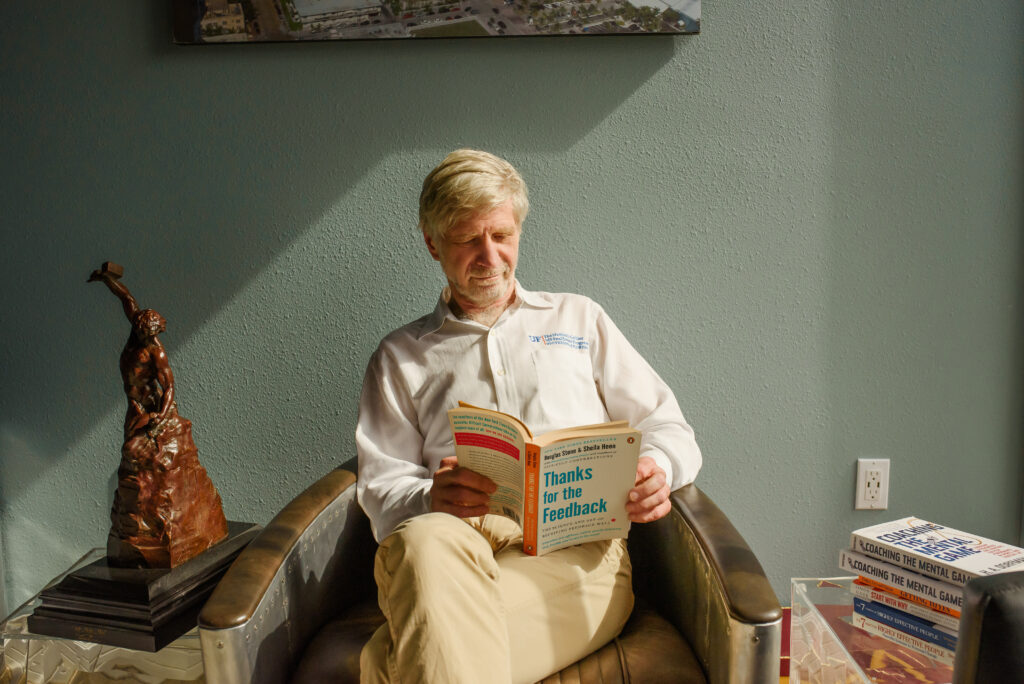 Encourage comes from the 15th-century Middle English word encoragen, which in turn came from the Anglo-French word encorager, or en- for in and curage for courage; literally, in-courage. When we encourage others, we “place” courage inside them.
Encourage comes from the 15th-century Middle English word encoragen, which in turn came from the Anglo-French word encorager, or en- for in and curage for courage; literally, in-courage. When we encourage others, we “place” courage inside them.
The Merrian-Webster Dictionary tells us that encourage means “to inspire with courage, spirit, or hope, to spur on, to help.” Synonyms for encourage include inspirit, hearten, and embolden, meaning to fill with courage or strength of purpose. Encourage “suggests the raising of one’s confidence by an external agency,” inspirit implies “instilling life, energy, courage, or vigor,” while to hearten implies “the lifting of dispiritedness or despondency by an infusion of fresh courage or zeal,” and embolden implies “the giving of courage sufficient to overcome timidity or reluctance.”
“Instilling life, energy, courage or vigor; to fill with courage or strength of purpose; to inspire with spirit or hope; infusion of fresh courage and zeal.” These are phrases than raise my spirits just to read them. I find them energizing, inspiring, hopeful, even——dare I say it——encouraging?
The idea of being able to encourage others, to share one’s strength of purpose, to spark another’s zeal and zest for life, to inspire and support someone’s hopes, dreams, and visions, and to help speed them along life’s path gives meaning to a day and spark to a life, ignites passion, and creates emotional juice!
But how to encourage others? Here are ten sure fire ways:
1. Show genuine interest: Show you care, give your attention——your full attention. Ask questions, get them talking about their interests.
2. Show appreciation, say thank you, have the sensory acuity, the emotional intelligence to wait for the right moment——moments perhaps others have missed and so your noticing is all the more important. I often deliver my appreciation for a good speech or important point made in a meeting the next day. The fact that I remembered it makes for greater impact. We often receive many kind remarks in the moment. Someone who remembers and helps us relive our good moments is greatly appreciated in return.
3. Be aware of what is important to them and respond to it, act on it.
4. Be a little kinder than you need to be.
5. Praise from the heart. Make sure that it is not facile flattery but sincere praise, reflecting a real moment of meaningful effort or noteworthy achievement.
6. Validate and affirm. We all long for validation and affirmation. Pretend that everyone is walking around with signs on their foreheads that say “Please, please make me feel important.”
7. Acknowledge their good intentions, think the best of them. Of all possible motivations or interpretations, pick the highest. People have seen things in me that I did not, and when they spoke glowingly of my potential, of the possibility they saw in me, I would have walked on hot coals rather than disappoint them.
8. Respond, stay in synch, reciprocate. Keep the relationship flow going, return favors. Show you value them. Offer to help if you see the need or opportunity.
9. Ask for help or advice. As long as it is reasonable, people often are pleased that you turn to them, that you consider their counsel worthy. Also, in some small way we feel more comfortable when someone owes us a favor, has a social debt with us, than the other way around.
10. Give a small, thoughtful gift at unexpected times, when there is no obligation or expectation. Something that says I was thinking of you, you are important, I thought you would like this.
I close with not one, not two, but THREE quotes on encouragement:
“Correction does much, but encouragement does more.” – Johann Wolfgang von Goethe
“A word of encouragement during a failure is worth more than an hour of praise after success.” – Anonymous
“You need to be aware of what others are doing, applaud their efforts, acknowledge their successes, and encourage them in their pursuits. When we all help one another, everybody wins.” – Jim Stovall, Olympic weightlifter, co-founder and president of the Narrative Television Network, which makes movies and television accessible for the blind and visually impaired.
(Quotes source: thinkexist.com)




